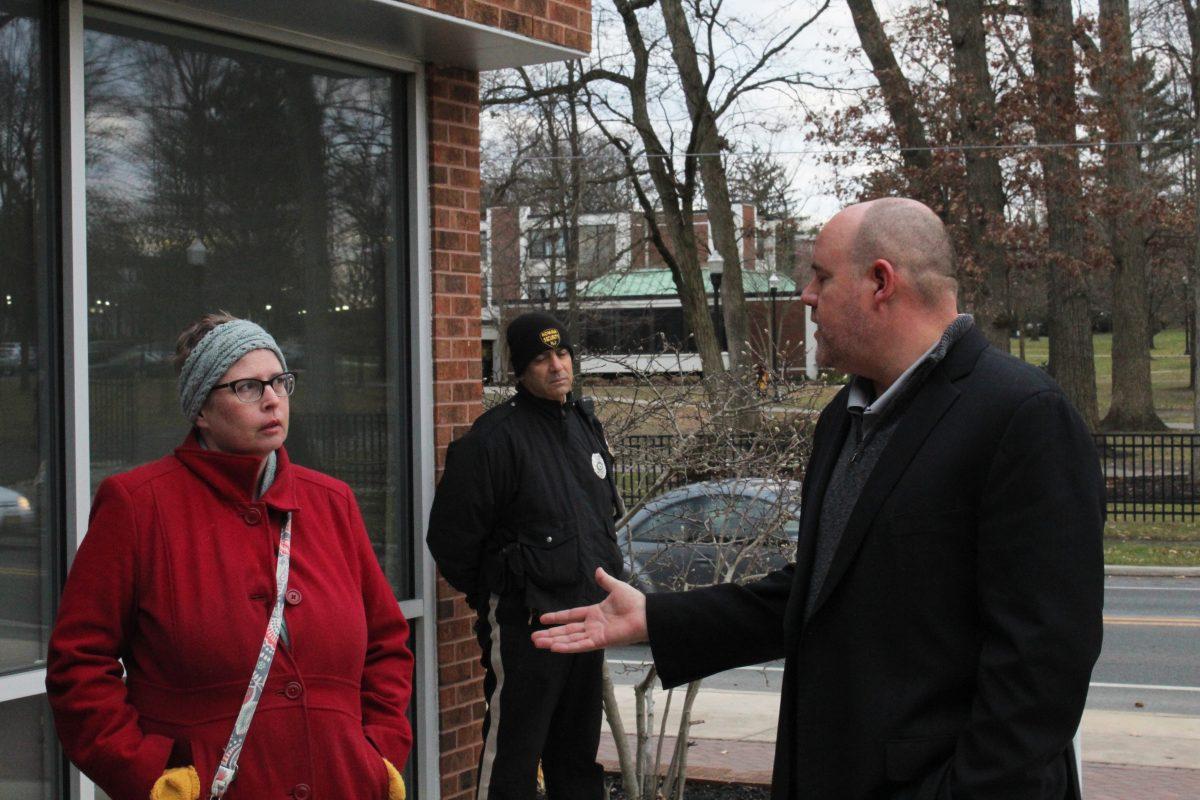This afternoon, following an incident at the Rowan Boulevard parking garage, students and faculty came together to discuss issues revolving around the Wellness Center and its handling of student mental health.
The impromptu meeting was held on the front steps of the Wellness Center. Discussion between participants focused on the experiences of themselves and those of people they know, as well as what improvements they think could be made at Rowan.
Ryan Payne, a 28-year-old graphic design major, expressed the importance of this gathering.
“We’re here because the school isn’t allocating the resources that are necessary for the students to be able to deal with health issues that they came to the school with, that they are having, because of school, the work,” he said. “With people, their roommates [dying by] suicide, things like that, there’s just a lack of resources that the school is providing.”
Payne met with the Wellness Center once last year. After opening up to a counselor during a lengthy consultation, he was never contacted again, an experience he considered to be demoralizing.
“I [was] so excited because I had never opened up,” Payne said. “So it was difficult for me to even go and do so in the first place. And that’s what I feel most people that have mental health issues feel, and then to not be contacted feels like a rejection. And then it put me in a spiral.”

Victoria Esquilin, a sophomore art education major, and Carly Weinstein, a sophomore art major with minors in psychology and law and justice, were two of the protesters at the Wellness Center. Both are roommates to someone who attempted suicide earlier this semester.
“We called Public Safety. They sent her to Jefferson [Hospital]. She was in the emergency room hallway for days before they sent her to [the] inpatient building in Cherry Hill, then they dropped her back off [to our apartment],” Esquilin said.
Weinstein added that their roommate had to arrange her own transportation back from inpatient in Cherry Hill, and that they were told they would be notified of her arrival back to campus, but never received any notification.
Esquilin has been fighting the Wellness Center since September. When her roommate came back, Esquilin fought to get an appointment at the Wellness Center right when the building was closing to get a check-up with a counselor.
“My roommate is not getting assistance from the school at all,” Esquilin said. “She can’t afford outpatient service.”
Esquilin hopes Rowan will communicate better. “There’s been eight suicides this semester, they need to take that really seriously. God forbid something [else] happens.”
“This won’t die out — I refuse,” Esquilin said of the discussions to get better resources at Rowan University for students who are struggling.
Students even put their sentiments online, calling for the recognition of mental health problems on campus by the university.
Carol Schottenfeld, an adjunct professor teaching a printmaking course, also showed her support for those in the Rowan community who are struggling with their mental health.
“I feel for my kids,” Schottenfeld said, emphasizing the need for students to have better access to mental health resources.
The experiences and voices of the student body and Rowan faculty are especially important at this time, given the fact that this has been “a semester in which we have suffered more losses than ever before,” according to a message from President Ali Houshmand via email earlier today.
Director for Student Health Services Scott Woodside joined the congregation on the Winans Hall patio to address the immediate concerns of the students who showed up.

“I hope I got good information out there,” Woodside said. “What they perceived might not necessarily be what’s happening in some cases, and in some cases maybe it is. I think I was open and honest, and that’s what we try to do. Everyone’s hurting at the end of the day, and I just want to make sure that we’re doing the best that we can. I hope that will allow [Rowan students] to come to us sooner when they’re feeling or seeing something that they think is a problem that we need to address.”
According to Woodside, his decision to use the moment to start a dialogue is one which is in line with the kinds of services that Rowan seeks to provide for its students.
“When tragedy happens, part of what we do at the Wellness Center is we respond,” Woodside said. “That’s something a lot of people don’t see unless they’re intimately involved in it, but we pour a lot of our hearts into helping people cope. By twenty people showing up outside of our door, they’re clearly struggling and they need something – so they need a response. There are a lot of very caring people here, and they do care deeply, and they do want to respond. I hope the conversation, once we get through supporting each other, gets to a point where we can talk about wellbeing so that we can help more people.”
If you are struggling with any of this information, you can speak with a counselor at the Wellness Center at 856-256-4333. They also have 24/7 counseling at 856-256-4922.
If you are in a suicidal crisis or emotional distress, call the National Suicide Prevention Lifeline at 1-800-273-8255 (TALK), available 24/7.
Reporting done by Kristin Guglietti, Christopher Connors, Kalie VanDewater, Tara Lonsdorf and Alexander Heller.
For comments/questions about this story, email [email protected] or tweet @TheWhitOnline























































































































































!["Working with [Dr. Lynch] is always a learning experience for me. She is a treasure,” said Thomas. - Staff Writer / Kacie Scibilia](https://thewhitonline.com/wp-content/uploads/2025/04/choir-1-1200x694.jpg)








































